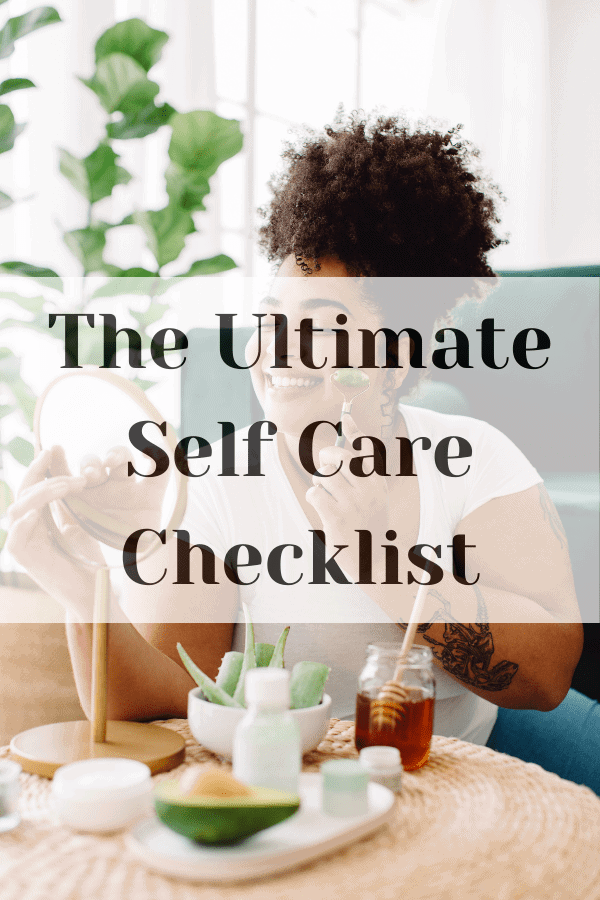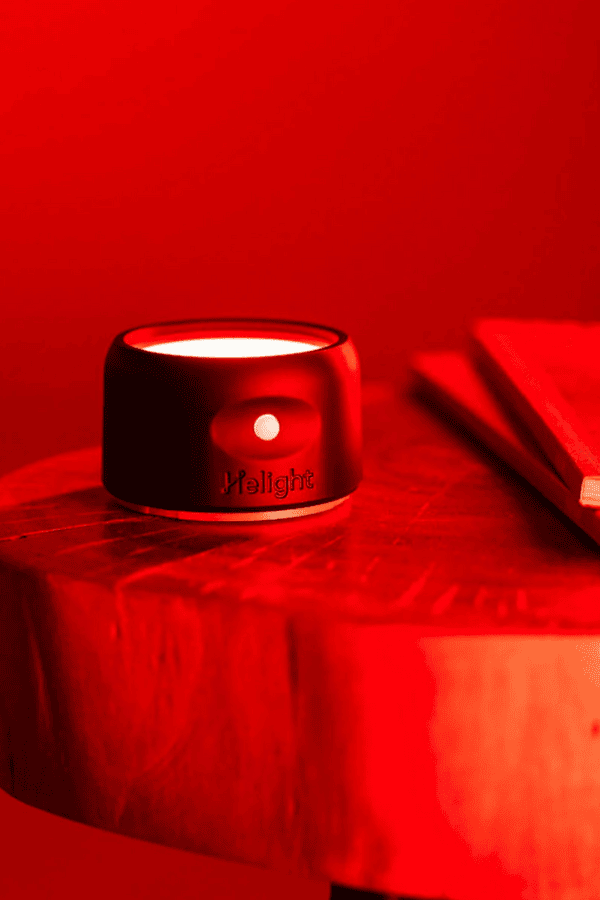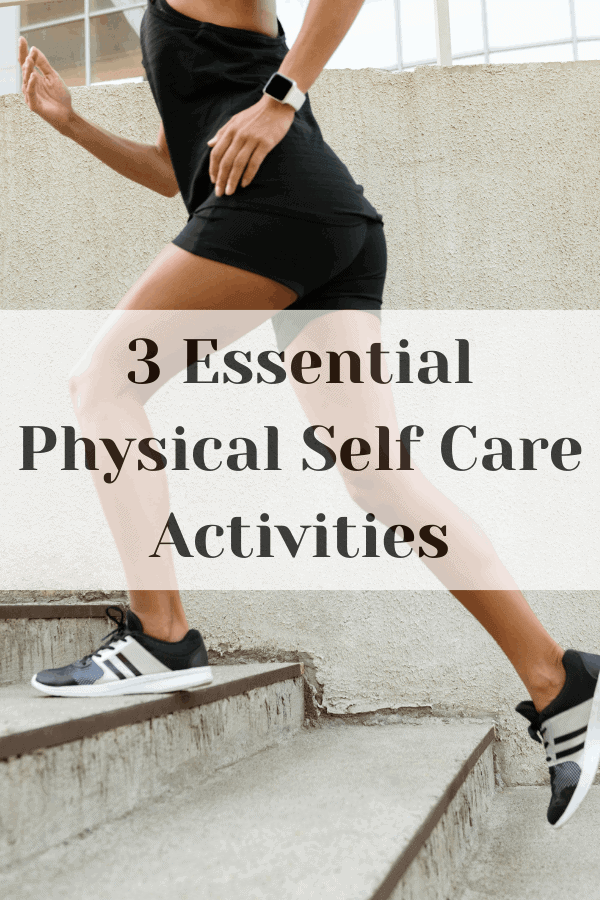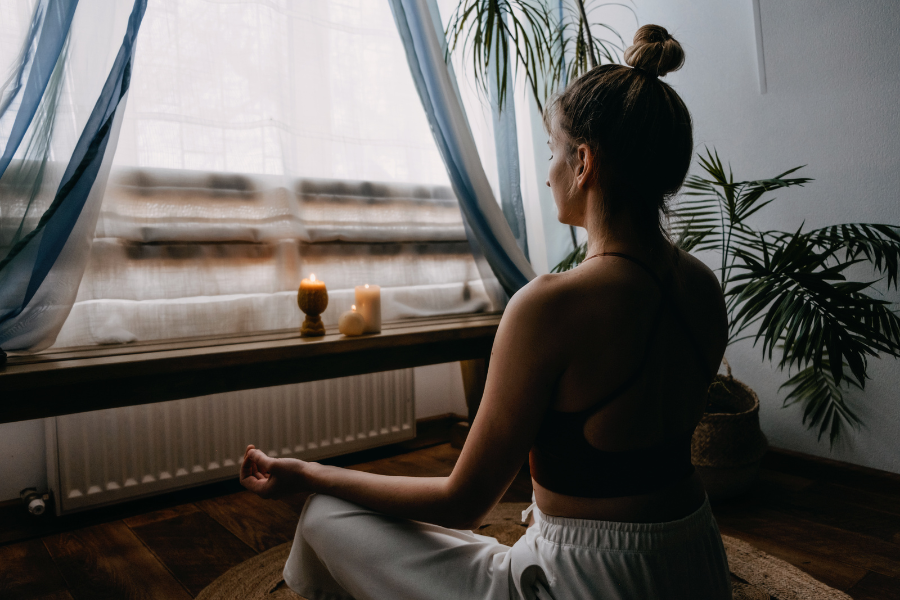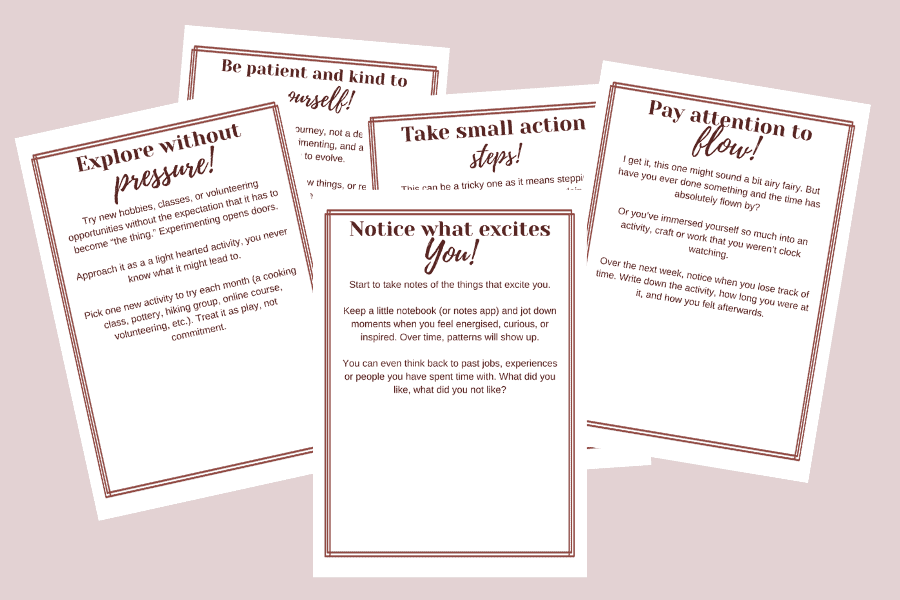How To Sleep Better At Night: Tips On How To Have A Restful Night
This post may contain affiliate links, which means I’ll receive a commission if you purchase through my links, at no extra cost to you. Please read full disclosure for more information.
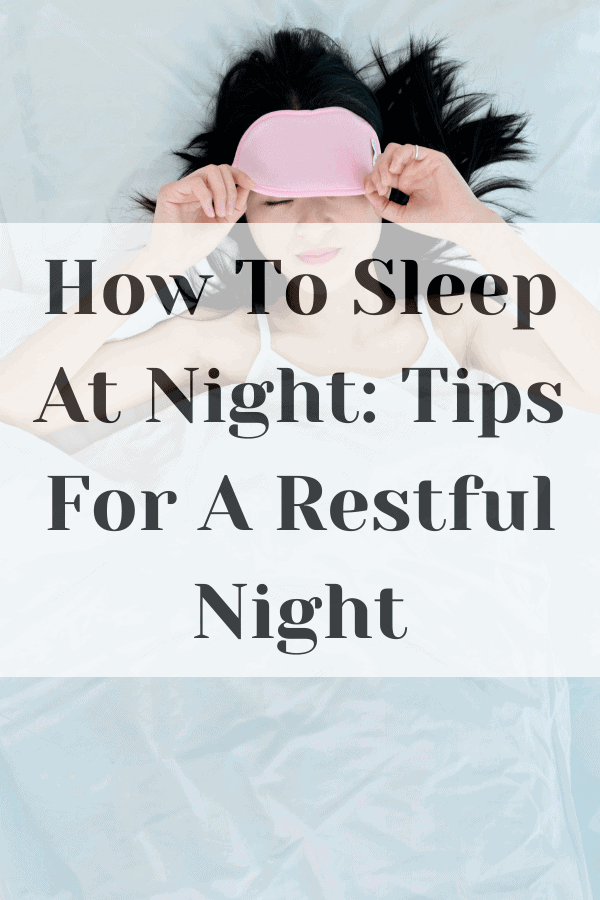
Do you find yourself staring at the ceiling, counting sheep, and wondering why sleep seems so elusive?
You’re not alone!
Many people struggle to get a good night’s sleep, tossing and turning for hours on end.
The frustration of not being able to sleep can affect your entire day, leaving you feeling exhausted, irritable, and less productive.
That’s where this blog post comes in.
I’m here to offer practical and effective tips on how to sleep better at night.
By implementing these strategies, you can create a bedtime routine that works for you, optimise your sleep environment, and make choices throughout the day that promote better sleep at night.
Good sleep is more than just a luxury; it’s a necessity.
Sleep is the foundation of a healthy and happy life. So, let’s dive into some tips to help you achieve the restful nights you deserve.
This blog is about how to sleep at night
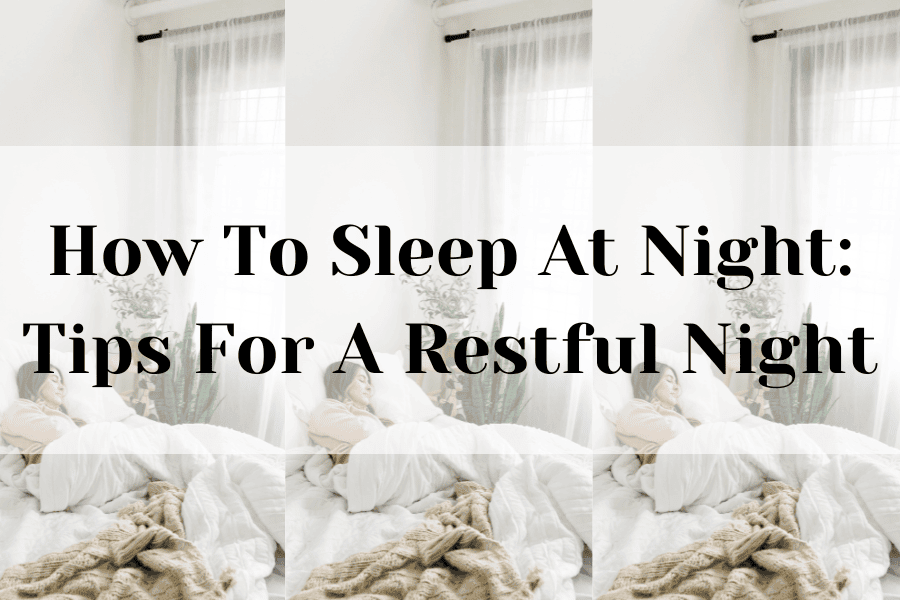
Establish A Bedtime Routine
Having a consistent sleep schedule is one of the most crucial steps in improving your sleep quality.
Our bodies have a natural circadian rhythm, a 24-hour internal clock that regulates our sleep-wake cycle.
When you go to bed and wake up at the same time every day, even on weekends, you help your body establish a routine that promotes better sleep.
A consistent schedule reinforces your body’s natural rhythm, making it easier to fall asleep and wake up feeling refreshed.
Setting a Fixed Bedtime and Wake-Up Time
Setting a fixed bedtime and wake-up time requires a bit of discipline but pays off significantly in the long run.
Determine Your Ideal Sleep Duration
Most adults need 7-9 hours of sleep per night. Figure out how much sleep you need to feel rested and set this as to your bedtime.
Gradually Adjust Your Schedule
If your current sleep schedule is far from ideal, don’t make drastic changes overnight. Gradually adjust your bedtime and wake-up time by 15-30 minutes each day until you reach your desired times.
Be Consistent
Stick to your schedule every day, even on weekends. Consistency is key to training your body’s internal clock.
Create a Sleep-Wake Alarm System
Set an alarm for bedtime as well as for waking up. This can help remind you when it’s time to start winding down and when it’s time to rise and shine.
Stay Committed
It might be tempting to stay up late or sleep in, especially on weekends, but staying committed to your schedule will lead to better sleep over time.
Relaxing Pre-Sleep Activities
In addition to setting a consistent sleep schedule, incorporating relaxing activities into your pre-sleep routine can significantly enhance your ability to fall asleep quickly and peacefully.
Reading
Reading a book can be a great way to wind down. Choose something light and engaging but not too stimulating. Avoid reading on electronic devices that emit blue light, as this can interfere with your sleep.
Taking a Warm Bath
A warm bath or shower before bed can help relax your muscles and prepare your body for sleep. The drop in body temperature after getting out of the bath can also signal to your body that it’s time to sleep.
Practicing Meditation or Deep Breathing
Engage in relaxation techniques such as meditation, deep breathing exercises, or progressive muscle relaxation. These practices can help reduce stress and calm your mind, making it easier to drift off to sleep.
Listening to Calming Music or Sounds
Soft, calming music or nature sounds can create a peaceful environment conducive to sleep. Consider using a white noise machine or a sleep sounds app to help you relax.
Avoiding Stimulants
In the hour leading up to bedtime, avoid stimulating activities like exercise, intense conversations, or screen time. Instead, focus on activities that help you unwind and signal to your body that it’s time to rest.
By establishing a consistent bedtime routine and incorporating these relaxing pre-sleep activities, you can train your body to recognise when it’s time to sleep, making it easier to fall asleep and stay asleep throughout the night.
Limit Screen Time
In today’s digital age, screens are everywhere—our phones, tablets, computers, and TVs.
While these devices are incredibly useful, they can wreak havoc on our sleep.
One of the main culprits is blue light.
Blue light is a high-energy visible light that is emitted by screens and artificial lighting.
When we expose ourselves to blue light in the evening, it tricks our brains into thinking it’s still daytime.
Over time, chronic exposure to blue light in the evening can lead to sleep disorders and negatively impact overall health.
Turning Off Electronic Devices Before Bed
To minimise the negative effects of blue light on sleep, it’s crucial to turn off electronic devices at least an hour before bedtime.
This allows your brain to transition into a more natural sleep-ready state.
Set a Curfew for Screens
Decide on a time when all screens will be turned off. Ideally, this should be at least an hour before you plan to go to sleep.
Create a Charging Station Outside the Bedroom
Move your phone and other electronics outside the bedroom to charge overnight. This reduces the temptation to check them in bed.
Use Blue Light Filters
If you must use your devices in the evening, consider using blue light filters or apps that reduce blue light emissions. Many devices also have a “night mode” that shifts the screen to warmer colours.
Use A Red Light
Red light therapy can enhance your body’s production of melatonin.The low-wavelength red light used in this therapy penetrates the skin and reaches deep into your cells, helping you sleep better.
Communicate Your Plan
Let family members or roommates know about your screen time curfew so they can support you and possibly join in.
Alternative Activities Before Bed
So, what can you do during that hour before bed when screens are off-limits?
Here are some relaxing tips:
Engaging in Gentle Stretching or Yoga
Gentle stretching or yoga can help release tension from your muscles and calm your mind. Focus on slow, deliberate movements and deep breathing.
Writing in a Journal
Spend some time reflecting on your day by writing in a journal. This can help clear your mind of any lingering thoughts or worries, making it easier to relax.
Practicing Meditation or Mindfulness
Engage in a meditation or mindfulness practice. This can help reduce stress and anxiety, creating a sense of calm before bed.
Enjoying a Warm Beverage
Sip on a warm, caffeine-free beverage like herbal tea or warm milk. These can have a soothing effect and signal to your body that it’s time to wind down.
Remember, the goal is to create a calming environment that prepares your mind and body for sleep.
Create A Sleep Friendly Environment
Your sleep environment plays a crucial role in the quality of your rest.
A comfortable, peaceful bedroom can significantly enhance your ability to fall asleep and stay asleep.
When your sleep environment is optimised, it signals to your body that it’s time to relax and recharge.
Tips for Keeping the Bedroom Cool, Dark, and Quiet
Creating the perfect sleep-friendly environment involves several key factors: temperature, lighting, and noise levels.
Keep the Bedroom Cool
The optimal sleep temperature for most people is between 60-67°F (15-19°C). A cool room helps lower your body temperature, which is necessary for falling asleep.
Use Fans or Air Conditioning
If your room tends to get too warm, consider using a fan or air conditioning to maintain a comfortable temperature.
Choose Breathable Bedding
Use sheets and blankets made of breathable materials like cotton or linen to prevent overheating.
Keep the Bedroom Dark
Blackout Curtains
Install blackout curtains or blinds to block out external light. This is especially useful if you live in an area with a lot of streetlights or if you need to sleep during the day.
Minimise Artificial Light
Turn off all lights, including nightlights, and cover any small light sources such as LED displays on electronic devices.
Use an Eye Mask
If blackout curtains aren’t an option, consider using a comfortable eye mask to keep light out.
Red Light Therapy
Invest in a red light for your bedside table. A red light helps you sleep better by producing melatonin, which helps regulate your sleep-wake cycle.
Keep the Bedroom Quiet
White Noise Machines
Use a white noise machine or app to drown out disruptive noises. White noise creates a consistent sound environment that can mask sudden, jarring sounds.
Earplugs
If you’re sensitive to noise, try using earplugs to block out sounds.
Soundproofing
Consider soundproofing your room with thick carpets, curtains, or even acoustic panels to reduce noise from outside.
Invest in a Good Mattress and Pillow
The quality of your mattress and pillows can make a significant difference in your sleep comfort.
Choosing the Right Mattress
Support and Comfort
Look for a mattress that provides the right balance of support and comfort for your body type and sleeping position.
Material
Consider the material of the mattress. Memory foam, latex, innerspring, and hybrid mattresses each offer different benefits.
Selecting Comfortable Pillows
Support for Your Neck and Head
Your pillow should support the natural curve of your neck and keep your spine aligned. Different sleeping positions (side, back, stomach) require different types of pillows.
Material and Fill
Pillows come in various fills such as memory foam, down, latex, and polyester. Choose a fill that feels comfortable and offers adequate support.
By focusing on creating a sleep-friendly environment, you can significantly improve your sleep quality.
A cool, dark, and quiet room, combined with a comfortable mattress and pillows, sets the stage for restful and restorative sleep.
Be Mindful Of Food & Drink
What you eat and drink throughout the day, especially in the hours leading up to bedtime, can have a significant impact on how you sleep at night.
Certain foods and beverages can either promote restful sleep or contribute to sleepless nights.
Digestive Comfort
Eating large, heavy meals too close to bedtime can cause discomfort and indigestion, making it harder to fall asleep. Spicy or acidic foods, in particular, can lead to heartburn or acid reflux, disrupting your sleep.
Energy Levels
Foods high in sugar and refined carbohydrates can cause spikes and crashes in your blood sugar levels, leading to energy fluctuations that can interfere with sleep.
Hydration
While staying hydrated is important, drinking too much fluid before bed can lead to frequent trips to the bathroom during the night, disrupting your sleep cycle.
Sleep-Friendly Snacks
If you find yourself needing a snack before bed, opt for foods that can actually promote better sleep.
Bananas
Bananas are rich in magnesium and potassium, which help relax muscles.
Almonds
Almonds are a good source of magnesium, which can help improve sleep quality by relaxing muscles and reducing stress levels.
Oatmeal
Oatmeal is not just a breakfast food. It’s rich in melatonin and complex carbohydrates, which can help increase the availability of tryptophan in the bloodstream.
Greek Yogurt
Greek yoghurt contains protein and calcium, both of which can help promote sleep. The calcium helps the brain use tryptophan to produce sleep-inducing melatonin.
Cherries
Cherries, especially tart cherries, are one of the few natural sources of melatonin. Eating cherries or drinking tart cherry juice can help regulate your sleep-wake cycle.
Whole-grain crackers and Cheese
The combination of carbohydrates from the crackers and the protein from the cheese can stabilise blood sugar levels and promote the production of serotonin, helping you feel calm and sleepy.
By being mindful of what you eat and drink before bed, you can set yourself up for a more restful night.
Manage Stress & Anxiety
Stress and anxiety are among the most common culprits behind sleepless nights.
When you’re stressed, your body goes into a state of heightened alertness, often referred to as the “fight or flight” response.
This response is great for dealing with immediate danger, but not so much when you’re trying to drift off to sleep.
Stress and anxiety can also cause racing thoughts, making it hard to relax and turn off your mind at night.
Addressing stress is crucial for improving sleep quality and overall well-being.
Relaxation Techniques
Incorporating relaxation techniques into your nightly routine can help calm your mind and body, making it easier to sleep at night.
Deep Breathing
Breathe in slowly through your nose, allowing your abdomen to rise, then exhale slowly through your mouth.
Deep breathing slows your heart rate, lowers blood pressure, and signals your body to relax.
Meditation
Engage in mindfulness meditation, focusing on your breath or a calming mantra. Guided meditation apps can also be helpful, providing structured relaxation sessions.
Meditation helps quiet the mind, reduce anxiety, and promote a state of calm conducive to sleep.
Progressive Muscle Relaxation
Practice progressive muscle relaxation by tensing and then slowly relaxing each muscle group in your body, starting from your toes and working up to your head.
This technique helps release physical tension and promotes overall relaxation.
By addressing stress and anxiety through relaxation techniques you can significantly improve your sleep quality.
Reducing stress before bed helps calm your mind and prepare your body for a restful night, ensuring you wake up feeling refreshed and ready to take on the day.
Natural Sleep Aids
When it comes to how to sleep at night, natural remedies can be a gentle and effective option.
Unlike prescription sleep medications, which can have significant side effects and potential for dependency, natural sleep aids tend to be milder and come with fewer risks.
Chamomile Tea
Chamomile tea is well-known for its calming and sleep-inducing properties.
Drinking a cup of chamomile tea about 30 minutes before bedtime. This can help relax your body and mind, making it easier to drift off to sleep.
Melatonin Supplements
Melatonin is a hormone naturally produced by the pineal gland in response to darkness. It helps regulate your sleep-wake cycle.
Melatonin supplements can be particularly helpful for people with irregular sleep schedules, jet lag, or sleep disorders.
The most natural tool for this is through a red light placed on your bedside table.
Valerian Root
Valerian root is an herbal remedy that has been used for centuries to treat insomnia and anxiety. It is believed to increase the levels of GABA, a neurotransmitter that promotes relaxation and sleep.
Valerian root can be taken as a supplement in capsule form or brewed into a tea.
Lavender
Lavender is renowned for its soothing scent, which can help reduce anxiety and promote better sleep. Studies have shown that lavender aromatherapy can improve sleep quality and duration.
Use lavender essential oil in a diffuser, apply a few drops to your pillow, or add it to a warm bath before bed.
Magnesium
Magnesium is a mineral that plays a crucial role in muscle relaxation and stress reduction. A deficiency in magnesium can lead to poor sleep quality and insomnia.
Take a magnesium supplement in the evening or consume magnesium-rich foods such as nuts, seeds, leafy greens, and whole grains.
Incorporating natural sleep aids into your nightly routine can be a helpful way to improve sleep quality.
However, always consult with a healthcare provider before starting any new supplement to ensure it’s safe and appropriate for you.
With the right guidance, you can find a natural solution that supports restful and rejuvenating sleep.
Remember, there is no one-size-fits-all solution when it comes to improving how to sleep at night.
Each person’s body and sleep needs are unique, so it’s important to experiment with different strategies to find what works best for you.
Start by incorporating a few of these tips into your nightly routine and observe how your sleep improves.
Don’t be discouraged if it takes some time to see results. Consistency and patience are key.
Finally, I hope these tips help you on your journey to better sleep.
Prioritising sleep is one of the best investments you can make in your health and happiness.
May your nights be restful, your dreams sweet, and your mornings refreshing.
Sweet dreams and good night!
This blog was about how to sleep at night
Share this post: on Twitter on Facebook



